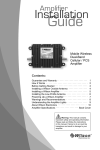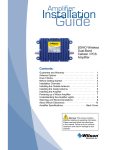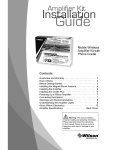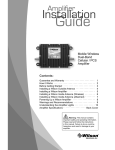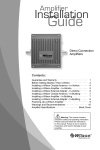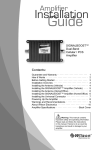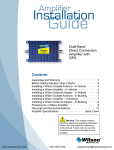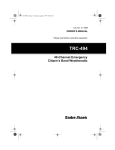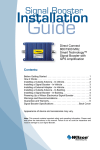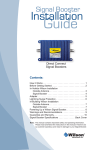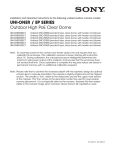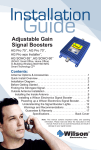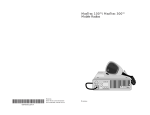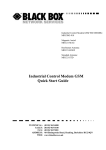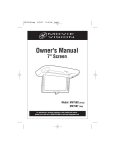Download Wilson Electronics 271245 Specifications
Transcript
Amplifier Installation stallat stallatio Guide Mobile Wireless Dual-Band Cellular / PCS Amplifier Contents: Guarantee and Warranty · · · · · · · · · · · · · · · · · · · · · · · · 1 How it Works · · · · · · · · · · · · · · · · · · · · · · · · · · · · · · · · · 2 Before Getting Started · · · · · · · · · · · · · · · · · · · · · · · · · · 3 Installing a Wilson Outside Antenna · · · · · · · · · · · · · · · 4 Installing a Wilson Amplifier · · · · · · · · · · · · · · · · · · · · · · 5 Installing a Wilson Inside Antenna (Wireless) · · · · · · · · 6 Installing a Wilson Inside Antenna (Attached) · · · · · · · · 7 Powering Up a Wilson Amplifier · · · · · · · · · · · · · · · · · · · 8 Warnings and Recommendations · · · · · · · · · · · · · · · · · 9 Understanding the Amplifier Lights · · · · · · · · · · · · · · · · 10 Amplifier Specifications · · · · · · · · · · · · · · · · · · Back Cover ! Warning: This manual contains important safety and operating information. Please read and follow the instructions in this manual. Failure to do so could be hazardous and result in damage to your amplifier. Wilson ® Electronics, Inc. 30-Day Money-Back Guarantee All Wilson Electronics products are protected by Wilson’s 30-day money-back guarantee. If for any reason the performance of any product is not acceptable, simply return the product directly to the reseller with a dated proof of purchase. 1-Year Warranty Wilson Electronics amplifiers are warranted for one (1) year against defects in workmanship and / or materials. Warranty cases may be resolved by returning the product directly to the reseller with a dated proof of purchase. Amplifiers may also be returned directly to the manufacturer at the consumer’s expense, with a dated proof of purchase and a Returned Material Authorization (RMA) number supplied by Wilson Electronics. Wilson shall, at its option, either repair or replace the product. Wilson Electronics will pay for delivery of the repaired or replaced product back to the original consumer. This warranty does not apply to any amplifiers determined by Wilson Electronics to have been subjected to misuse, abuse, neglect, or mishandling that alters or damages physical or electronic properties. RMA numbers may be obtained by phoning Technical Support at 866-294-1660. Operation is subject to the following two conditions: (1) This device may not cause interference, and (2) this device must accept any interference, including interference that may cause undesired operation of this device. Disclaimer: The information provided by Wilson Electronics, Inc. is believed to be complete and accurate. However, no responsibility is assumed by Wilson Electronics, Inc. for any business or personal losses arising from its use, or for any infringements of patents or other rights of third parties that may result from its use. Copyright © 2007 Wilson Electronics, Inc. All rights reserved. 1 Installation Instructions for the Following Wilson Amplifier: Mobile Wireless Dual-Band Amplifier Model # 271245, Part # 801201 FCC ID: PWO8012SM IC: 4726A-8012SM The term “IC” before the radio certification number only signifies that Industry Canada technical specifications were met. Inside this Package Wireless amplifier Low-profile antenna (Option A - see p. 6) DC plug-in power supply Universal Connector (Option B - see p. 7) How it Works Your new Wilson amplifier has been carefully engineered to significantly improve the performance of your cell phone or cellular data card in mobile applications. Together with an outside antenna (sold separately), the amplifier’s state-of-the-art technology is designed to increase your signal up to 10 times, reduce disconnects and dropouts, and increase data communication rates needed for 3G technologies. The outside antenna will collect the cell tower signal and send it through the cable to the amplifier. The signal is then boosted and sent through the inside antenna or to the universal connector, depending on your application. Your cell phone or data card then communicates with the improved signal. When the cell phone or data card transmits, the signal goes through the inside antenna or the universal connector, is boosted by the amplifier and broadcast back to the cell tower through the outside antenna. Wilson Electronics manufactures a wide variety of antennas to help you customize your amplifier for your specific application. Several are shown below. See your dealer or visit www.wilsonelectronics.com. NOTE: Use of this amplifier with an antenna gain higher than 6.12 dBi is in violation of FCC regulations for which the offender is fully liable. All Wilson mobile antennas are 6.12 dBi or less. Mini Magnet Dual-Band Magnet Mount Dual-Band Trucker Mount Dual-Band Marine Antenna Dual-Band NMO Mount Dual-Band 2 Before Getting Started This guide will help you properly install Wilson’s dual-band, mobile wireless amplifier. It is important to read through all of the installation steps for your particular application prior to installing any equipment. Read through the instructions, visualize where all the equipment will need to be installed and do a soft installation before mounting any equipment. If you do not understand the instructions in full, seek professional help, or contact Wilson Technical Support at 866-294-1660. Installation Diagram Inside Antenna Outside Antenna ! Warning: In a wireless installation, do not plug the amplifier directly into the cell phone or data card using an antenna adapter. It will damage the amplifier. Cell Phone PDA Notebook Inside Antenna DC Power Supply Amplifier Installation Diagram Universal Connector Outside Antenna ! Warning: In a wireless installation, do not plug the amplifier directly into the cell phone or data card using an antenna adapter. It will damage the amplifier. Cell Phone, PDA or Notebook with universal connector attached (see pg. 7) DC Power Supply Amplifier 3 Installing a Wilson Outside Antenna To receive the best cell signal, select a location in the center of the vehicle’s roof 12 inches away from any other antennas and free of obstructions. Follow the specific antenna installation instructions included with the outside antenna (sold separately). ! Warning: Do not use any type of glassmount antenna with this amplifier. The outside and inside antennas must be shielded from each other to prevent oscillation. The outside antenna must be installed vertically. Signal performance will be degraded if the antenna is not vertical. Optional MagnetMount Antenna Shown Part #301103 The antenna cable may be run through the door to the amplifier. ! Warning: The outside antenna must have a separation of at least 10 inches from all persons during normal operation. Carefully Pull Down Door Seal Run Cable Under Seal For a more professional-looking installation, the antenna cable may be run under the door seal. Carefully pull down the door seal. Run the cable through the seal and push the seal back into place. This prevents constant wear and tear on the cable as the door opens and closes. The antenna cable is small enough to easily tuck under the door seal or plastic molding. Tuck Cable Under Seal 4 Installing a Wilson Amplifier ! Warning: Do not plug in the DC power supply until the outside and inside antenna cables are attached to the amplifier. Select a location to install the amplifier that is away from excessive heat, direct sunlight or moisture and that has proper ventilation. Recommended installation locations are: • Under the seat • In the trunk • Under the dash Run the cable from the outside antenna and attach it to the FME-Male connector labeled “outside antenna” on the amplifier. Attach the inside antenna cable to the FMEMale connector labeled “inside antenna” on the amplifier. Wilson offers two options of improved signal inside a vehicle: Option A (Wireless) - offers the convenience of no physical connection to the cell phone or cellular data card. Option B (Attached) - places the universal connector directly on the cell phone or cellular data card for maximum signal performance. 5 Option A (Wireless) Installing a Wilson Inside Antenna Low-profile Antenna Install the low-profile inside antenna 8-12 inches from where the cell phone or cellular data card will be used. Amplifier ! Warning: Do not install the low-profile antenna within four inches of metal. (Metal found inside the vehicle’s seat will not affect the antenna’s performance.) Place the inside antenna on the side of the driver’s seat for maximum performance. Install the inside antenna at least eight inches, but not more than 12 inches, from where the cell phone or cellular data card will be used. Install the inside antenna at the same angle as the cell phone when held in use, or place next to the laptop’s cellular data card. This will maximize the signal strength. For a more professional-looking installation, the low-profile antenna may be slid under the seat cover or leather, high on the driver’s seat. ! Warning: The inside antenna must be installed with a separation of at least eight inches from all persons and must not be located in conjunction with any other antenna or amplifier. 6 Option B (Attached) Installing a Wilson Universal Connector Amplifier Universal Connector The universal connector must be placed directly on the cell phone or cellular data card to work properly. Attach the universal connector to the cell phone or cellular data card with the VELCRO® included in the package. IMPORTANT: The adhesive of the gray Velcro patch that adheres to the back of your phone needs time to “cure.” For best results, do not use the Velcro connection for a minimum of 24 hours after application. The universal connector included in the package is long enough to reach the amplifier location. This allows for ease and convenience of use. To adjust the universal connector for the best signal, go to a weak signal location where your cell phone registers only 1-2 bars without the universal connector connected. Then, attach the universal connector to the phone and you should see a signal improvement of 2 or more bars. Cellular data card NOTE: Many phones take up to 20 seconds to reset the bar indicator. To maximize performance, attach the universal connector as close as possible to the original antenna on your cell phone or cellular data card. For cell phones with an internal antenna, place the universal connector on the back, upper left-hand corner of the phone. (Figure 1) NOTE: Certain phones, such as the Motorola RAZR, have internal antennas at the base, rather than the top, in which case the universal connector should be attached at the bottom rear of the phone. For cell phones with an external antenna, place the universal connector directly below the phone’s original antenna. (Figure 2) If you have any questions as to the location of the antenna on your phone, call Wilson Technical Support at 866-294-1660 or visit www.wilsonelectronics.com. Figure 1 7 Figure 2 To Amplifier Powering up a Wilson Amplifier Make sure both the outside and inside antenna cables are connected before powering up the amplifier. Connect the power cable from the DC plug-in power supply to the amplifier marked “Power” and insert the large end into DC power socket (the cigarette lighter outlet.) Carefully insert the power cable. ! Warning: Use only the power supply provided in this package. The power supply must be 6 V DC. The amplifier may remain on all the time. However, leaving the amplifier on in a vehicle when it is not running can discharge the battery in a day or two. IMPORTANT: Do not power up the amplifier unless antenna cables are attached to amplifier. A good option is to power the amplifier through the ignition switch so the amplifier is turned on and off with the vehicle. NOTE: The aluminum casing of a Wilson amplifier will adjust very quickly to the ambient temperature of its environment. For example, in the summer, when the inside of a car can reach 140 degrees Fahrenheit, the amplifier temperature may be 150 degrees or higher. The casing will be hot to the touch, similar to a metal door handle or a steering wheel. Such high temperatures will not damage the amplifier, nor do they pose a fire risk to the vehicle. As recommended in these instructions, install the amplifier in a location with adequate ventilation, such as under the seat, in the trunk or under the dashboard. Keep the area free of items that could block air flow to the amplifier. 8 Warnings and Recommendations Warning: In a wireless installation, do not plug the amplifier directly into the cell phone or cellular data card using an antenna adapter. It will damage the cell phone or cellular data card. Warning: Do not plug in the DC power supply until the outside and inside antenna cables are attached to the amplifier. Warning: RF Safety: The inside antenna must be installed with a separation of at least eight inches from all persons and must not be located in conjunction with any other antenna or amplifier. Warning: RF Safety: The outside antenna must be installed with a separation of at least 10 inches from any of the vehicle’s occupants or nearby persons and must not be located or operating in conjunction with any other antenna or amplifier. All roof-mount antennas should be centrally located on the roof of the vehicle. Mirror-mount antennas should be at least six inches from the ground and leave at least 20 inches of separation from any persons near or around the vehicle. Use of this cellular amplifier with an antenna gain higher than 6.12 dBi is in violation of FCC regulations for which the offender is fully liable. All Wilson mobile antennas are 6.12 dBi or less. Separation of inside and outside antennas is very important. The metal roof of the vehicle acts as a barrier and helps shield the two antennas from each other, preventing oscillation. If the vehicle has a sunroof, it is important to separate the inside and outside antennas by at least five feet. This prevents the amplifier from overloading or oscillating. Distance between antennas through a sunroof must be 5 feet or more. 9 Understanding the Amplifier Lights The power light PWR will turn green when the amplifier is successfully powered up. When the 800 MHz or 1900 MHz lights are lit green, the amplifier is amplifying the outside signal. If one or both frequency lights turn red, oscillation is occurring and the amplifier has powered down. The outside antenna needs to be moved farther from the inside antenna. Move the outside antenna on the roof of the car to the rear of the car, but at least 8-12 inches from the rear or side windows. Remove power from the amplifier and reinstall power - this resets the amplifier. If the lights are now green, the oscillation has stopped and the amplifier is working. If the red light is still on, move the antenna farther away and repeat the process. Always use a magnet-mount or roofmount antenna. Do not use a glassmount antenna, as oscillation may cause continuous shut-down of the amplifier. An amber light in either the 800 MHz or 1900 MHz position indicates overload from the cell site. The amplifier has temporarily shut down and will automatically reset. 10 Amplifier Specifications Dual Band 800/1900 MHz Specifications 271245 / 801201 FME-Male 50 ohms 5.6 x 3.6 x 1.7 inch or 14.2 x 9.1 x 4.4 cm 1.44 lbs or 0.65 kg 824-894 MHz / 1850-1990 MHz Model Number / Part Number Connectors Impedance (input/output) Dimensions Weight Frequency 1 Passband Gain (nominal) 800 MHz 1900 MHz 2 50 dB 60 dB 20 dB Bandwidth (nominal) 800 MHz (uplink/downlink) 1900 MHz (uplink/downlink) Power output for single cell phone (uplink) CDMA GSM EDGE AMPS 3 Power output (uplink) for multiple cell phones: Number of cell phones 2 3 4 5 6 Power output for single received channel (downlink) CDMA GSM EDGE AMPS 53.5 MHz / 47.7 MHz 86 MHz / 83 MHz 800 MHz +30.9 dBm +30.0 dBm +30.4 dBm +30.2 dBm 1900 MHz +30.5 dBm +29.7 dBm +30.3 dBm Maximum Power 800 MHz 1900 MHz +25.0 dBm +21.5 dBm +19.0 dBm +17.0 dBm +15.5 dBm +24.7 dBm +21.2 dBm +18.7 dBm +16.7 dBm +15.2 dBm 800 MHz 1900 MHz +10.0 dBm +11.0 dBm +10.9 dBm +10.3 dBm +9.9 dBm +9.9 dBm +9.6 dBm 4 Power output for multiple received channels (downlink). The maximum power is reduced by the number of channels: Noise Figure (typical) Isolation Power Requirements Amplifier Usage Maximum Power Number of channels 2 3 4 5 6 800 MHz 1900 MHz -11.6 dBm -15.1 dBm -17.6 dBm -19.6 dBm -21.1 dBm -3.1 dBm -6.6 dBm -9.1 dBm -11.1 dBm -12.6 dBm 3 dB nominal > 90 dB 6 V, .5 A - 1.5 A (subject to uplink power) Notes: 1. Nominal gain is the maximum gain at any frequency in the passband. Average gains are: 37 dB (800 MHz uplink & downlink) 45 dB (1900 MHz uplink & downlink) 2. Nominal bandwidth is the difference between two frequencies that are adjacent to the passband where the amplification is 20 dB lower than the passband amplification. One of the frequencies is lower than the passband and the other is higher. 3. The Manufacturer’s rated output power of this equipment is for single carrier operation. For situations when multiple carrier signals are present, the rating would have to be reduced by 3.5 dB, especially where the output signal is re-radiated and can cause interference to adjacent band users. This power reduction is to be by means of input power or gain reduction and not by an attenuator at the output of the device. 4. The maximum power for 2 or more simultaneous signals will be reduced by 6 dB every time the number of signals is doubled. Phone: 866-294-1660 Wilson® Electronics, Inc. www.wilsonelectronics.com Fax: 435-656-2432 Part #110435 AIG MW 043 / 12.28.07












